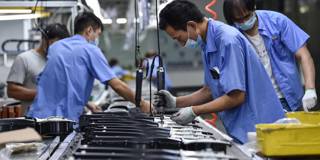Today’s supply-chain policy challenges are a consequence of forgetting that other considerations besides economic efficiency matter, and that hands-on craft knowledge cannot be transmitted online. Unfortunately, problems that have been four decades in the making cannot be solved overnight.
CAMBRIDGE – Starting in the 1980s, transnational production enabled the expansion of global trade and low prices for goods, contributing significantly to economic growth. But the shocks caused by the COVID-19 pandemic and the Ukraine war have shown firms that the efficiency gains implied by the global division of labor – and just-in-time production – come at the cost of resilience. With global supply-chain bottlenecks unlikely to resolve themselves soon, firms have turned their attention to reshoring or at least “friend-shoring,” which seeks to combine closer geographic proximity with greater geopolitical peace of mind.

CAMBRIDGE – Starting in the 1980s, transnational production enabled the expansion of global trade and low prices for goods, contributing significantly to economic growth. But the shocks caused by the COVID-19 pandemic and the Ukraine war have shown firms that the efficiency gains implied by the global division of labor – and just-in-time production – come at the cost of resilience. With global supply-chain bottlenecks unlikely to resolve themselves soon, firms have turned their attention to reshoring or at least “friend-shoring,” which seeks to combine closer geographic proximity with greater geopolitical peace of mind.